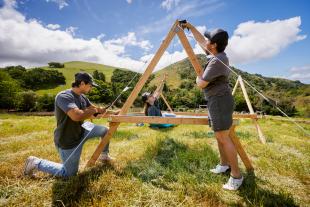'A Great Service for the Community.' How the Low Income Taxpayer Clinic Serves Clients in a Pandemic
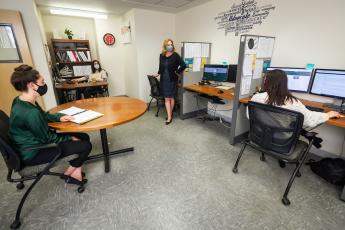
For 10 years, the Low Income Taxpayer Clinic within the Orfalea College of Business has served people in need from all over central California while providing a valuable Learn by Doing experience for accounting students. But when the pandemic hit last spring, the LITC had to readjust to continue safely upholding their mission.
“My biggest concern was confidentiality issues, because students are handling very confidential information,” said Lisa Sperow, the clinic’s executive director. “Clients send us things like bank statements, medical records and tax returns. At that point, in the spring, I wasn’t quite sure how that was going to work in a completely virtual environment.”
In a typical year, the LITC works with clients who meet low-income guidelines and have a controversy, or legal dispute, with the IRS. Volunteer lawyers, along with students, remedy the situation, advocating on their clients’ behalf and finding workable solutions with the IRS. There’s also an educational component, where LITC students go out into the campus and the greater SLO County community to educate people about their rights and responsibilities as taxpayers.
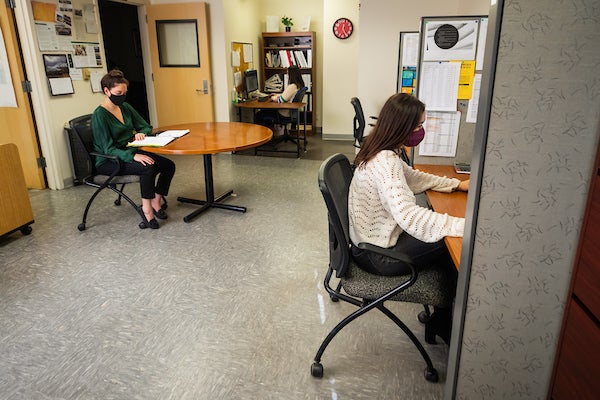
Sperow canceled the spring clinic course while the LITC worked with IT to address security concerns. She also kept on a few trusted students who worked remotely to resolve any ongoing issues for clients: all team leaders, which are typically students who’ve been through the LITC before and help guide current students. Eddy Quijano, the clinic’s founder and a pro bono panel member lawyer, helped out during the spring quarter and subsequent shift in the clinic’s operations.
“Lisa (Sperow)’s clinic is top-drawer. The best in California, measured in terms of production, representation and consultations,” Quijano said. “Her leadership has made the process during the pandemic seamless, effective and productive as an outstanding clinic transferred to an online method.”
Juan Moreno, who’s getting his master’s degree in taxation, was one of those students kept on during the 2020 spring quarter. Moreno, a team leader at the LITC since fall 2019, knew he was going to come back as a team leader in the fall quarter of 2020, when things would look very different.
“It was a big team effort,” said Moreno, who is currently interning with Ernst & Young and has plans to come back to the LITC in the spring quarter. “We serve low-income people, and unfortunately a lot of low-income people typically don’t have the same level of internet access. We were really worried about it and we thought we were just not going to be able to operate at all, but we were able to pull it off.”
Frank Gonzales, the college’s IT consultant, configured the LITC system so students could access the computers in the clinic securely and remotely. Some students still needed to be in the clinic to print documents and carry out functions that couldn’t be done via computer, making the LITC the only class within OCOB with an in-person component.
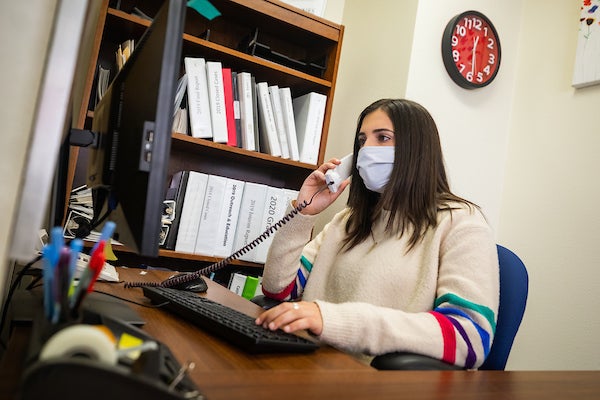
“I do remember spending a good portion of Saturdays and Sundays in the LITC office reconfiguring and installing some of the software that was needed for remote access,” Gonzales recalled. “The LITC is such a great service for the community and a really powerful Learn by Doing experience for our students, so we wanted to make sure we did everything possible to keep them running safely and securely.”
Another issue that had to be worked out was how to help clients safely and securely drop off documents if they weren’t able to scan or fax documents over.
“We’re not doing any interaction with clients in person. A lot of our clients are elderly too, which puts them in a high-risk category,” Sperow said, adding that while phone calls and emails have been helpful, the biggest challenge has been getting documents as not everyone can afford to fax, mail, or scan them over. “We have free scanning apps we recommend clients use if they have a smart phone, but that’s been a challenge. Often, in order to help them, we really need to see what kind of notices they’re getting from the IRS or what their documents prove.”
While at first students worked with clients to coordinate contactless delivery to the clinic, there’s now a secure dropbox out front for clients to use.
When Christiana Tarazi took the LITC class in the fall, she wasn’t sure what to expect. Tarazi chose to work in-person at the LITC, along with a few other students — working in concert with students who had chosen to stay remote and completing work that couldn’t be done virtually.
“It was definitely different from what I expected because in previous years, you could meet with the client face-to-face and have them quickly sign documents and obviously that can’t happen now,” Tarazi said. “But the team leaders I had, and Lisa [Sperow] made it so seamless and easy that I didn’t have a problem with it at all.”
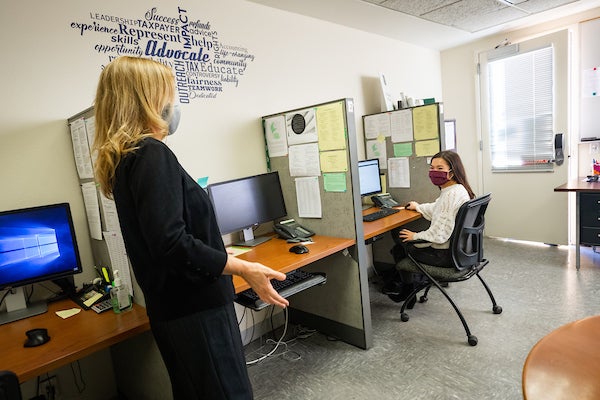
The in-person students were restricted to hourly shifts of 6 hours a week, with no more than 3 students as well as Sperow or a team leader, in the clinic at any time. Other team leaders were available via Zoom, as were the remote students.
“I was used to being in the clinic and able to be there and look at the students’ computers,” Moreno said. “When we went mostly virtual, there was a very unique balance of giving them very specific instructions on what they needed to do without hovering.”
Zoom and Microsoft Teams helped Moreno set up tasks for the students, and instantaneous computer chat was useful when students needed urgent guidance.
“The transition was a lot easier than I thought it was going to be and I think the work quality was even that much better,” Moreno said.
The other piece of the LITC’s mission, educating taxpayers about their rights and responsibilities, presented a different kind of challenge. In normal times, the LITC would set up a booth at the San Luis Obispo Farmer’s Market, attend events for veterans, senior citizens and farmworkers, and go into Cal Poly dorms bearing food and information.
Since those aren’t possible right now, the LITC is exploring Facebook Live events, educational videos and is participating in Cuesta College’s virtual financial literacy fair this quarter.
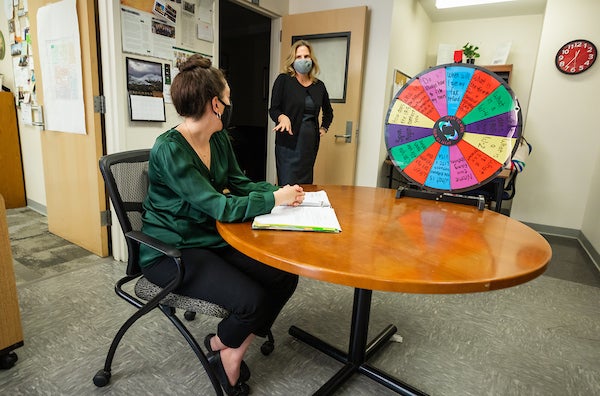
“We’re just trying to be creative right now about ways we can keep everybody safe and still maintain our mission,” Sperow said.
While a mostly virtual environment presents challenges, both Sperow and her students said being able to help their clients safely has been the best and most important part of their work.
“We don’t get lavish gifts from our clients; we don’t get extravagant parties. But they call us almost in tears thanking us for the work we’ve done for them,” Moreno said. “That, to me, has an incredible amount of value. It makes all the work that much more worth it and it makes staring at the computer for hours on end very much worth it.”




